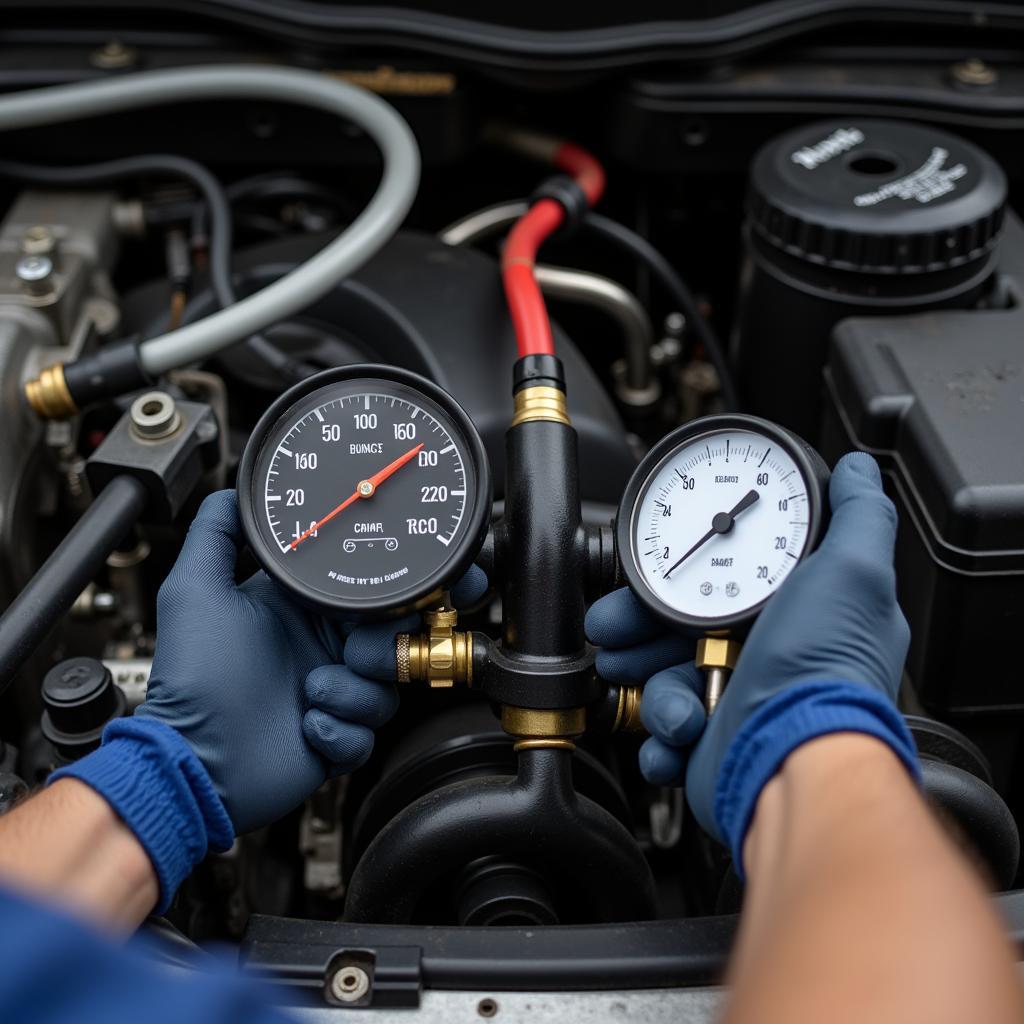Experiencing the frustration of a car AC blowing hot air during a scorching summer day? You’re not alone. A malfunctioning car AC is a common problem, but with a bit of troubleshooting, you can often pinpoint the culprit and get your car’s cool air flowing again. This guide will walk you through the possible reasons for “no AC in car” situations and provide practical solutions to get your AC back on track.
 Car AC Not Working
Car AC Not Working
Common Causes of Car AC Failure
Before diving into fixes, it’s crucial to understand the common culprits behind a failing car AC system:
-
Refrigerant Leak: One of the most frequent reasons for a car AC not working is a refrigerant leak. The refrigerant, often referred to as Freon, is the lifeblood of your AC system, and even a tiny leak can significantly impact its cooling ability.
-
Faulty Compressor: The compressor is the heart of your AC system, responsible for pressurizing and circulating the refrigerant. A failing compressor, often indicated by unusual noises when the AC is on, can lead to a complete loss of cooling.
-
Electrical Issues: Like any other system in your car, the AC system relies on electrical components such as fuses, relays, and wiring. A blown fuse, a faulty relay, or damaged wiring can disrupt the flow of power to the AC system, rendering it inoperable.
-
Clogged Condenser: The condenser, located at the front of your car, cools the refrigerant. Over time, it can get clogged with debris like dirt, leaves, and insects, hindering the heat exchange process and leading to poor AC performance.
-
Broken Cooling Fans: Your car’s cooling fans play a vital role in dissipating heat from the condenser. If the fans malfunction, the condenser can overheat, affecting the AC’s ability to cool effectively.
Troubleshooting Your Car’s AC
Now that you know the potential causes, let’s explore some troubleshooting steps to diagnose the issue:
-
Check the AC Fuse: Locate your car’s fuse box (usually under the dashboard or in the engine bay) and consult your owner’s manual to identify the AC fuse. Inspect the fuse for any signs of a break or burn. Replace the fuse if necessary.
-
Inspect the Drive Belt: Your AC compressor is usually powered by a drive belt. A loose, cracked, or broken drive belt can prevent the compressor from functioning correctly.
-
Feel the AC Lines: With the engine running and AC on max, carefully feel the two metal lines connected to the AC compressor. One should be hot, and the other should be cold. If both lines are close to the same temperature, it could indicate a refrigerant leak or a compressor issue.
 Mechanic Checking AC Lines
Mechanic Checking AC Lines
- Listen for Unusual Noises: Turn on your AC and listen carefully for any strange noises coming from the AC system. Clicking, rattling, or squealing sounds can be indicative of a failing compressor or other mechanical issues.
DIY Fixes for No AC in Car
While some AC problems require professional attention, you can attempt a few DIY fixes:
-
Recharge Your AC: If you suspect a low refrigerant level, consider using an AC recharge kit. However, ensure you choose a kit compatible with your car’s refrigerant type and follow the instructions carefully. Remember, refrigerant is hazardous, and improper handling can be dangerous.
-
Clean the Condenser: Use a garden hose or compressed air to gently clean the condenser fins, removing accumulated debris. Be careful not to bend the delicate fins during the cleaning process.
-
Check for Obstructions: Make sure there are no obstructions blocking the air intake vents inside your car or the airflow to the condenser.
When to Seek Professional Help
If your troubleshooting efforts don’t resolve the “no AC in car” problem or you suspect a more complex issue, it’s best to seek professional assistance. Here are some instances where a mechanic’s expertise is essential:
-
Refrigerant Leak Repair: Repairing a refrigerant leak involves specialized equipment and expertise. A certified technician can locate and repair the leak and recharge the system to the correct pressure.
-
Compressor Replacement: Compressor replacement is a complex and labor-intensive task best left to professionals.
-
Electrical System Diagnosis and Repair: Diagnosing and repairing electrical issues related to your car’s AC system can be challenging and potentially dangerous without the proper knowledge and tools.
Preventing Future AC Problems
Prevention is key to avoiding the inconvenience and cost of car AC repairs. Here are some preventive measures to keep your AC system running smoothly:
-
Regular AC Service: Get your car’s AC system inspected and serviced annually or as recommended in your owner’s manual.
-
Keep it Running: Even during cooler months, run your AC for a few minutes every couple of weeks to keep the refrigerant circulating and lubricate the system’s components.
-
Address Issues Promptly: Don’t ignore any signs of AC trouble, such as weak airflow or unusual noises. Addressing issues early can often prevent more significant problems down the line.
Conclusion
A malfunctioning car AC can turn your comfortable drive into a sweltering ordeal. By understanding the common causes and following the troubleshooting tips outlined in this guide, you can often diagnose and potentially fix minor AC problems yourself. However, for more complex issues or if you’re unsure about tackling repairs yourself, it’s always best to seek help from a qualified auto mechanic. Remember, a well-maintained AC system ensures a comfortable and enjoyable driving experience, especially during hot weather.
For any further assistance or to schedule an appointment for expert AC repair, contact us at AutoTipPro at +1 (641) 206-8880. Our team of experienced technicians at our San Antonio office located at 500 N St Mary’s St, San Antonio, TX 78205, United States is dedicated to providing top-notch automotive services to keep you cool on the road.




Leave a Reply